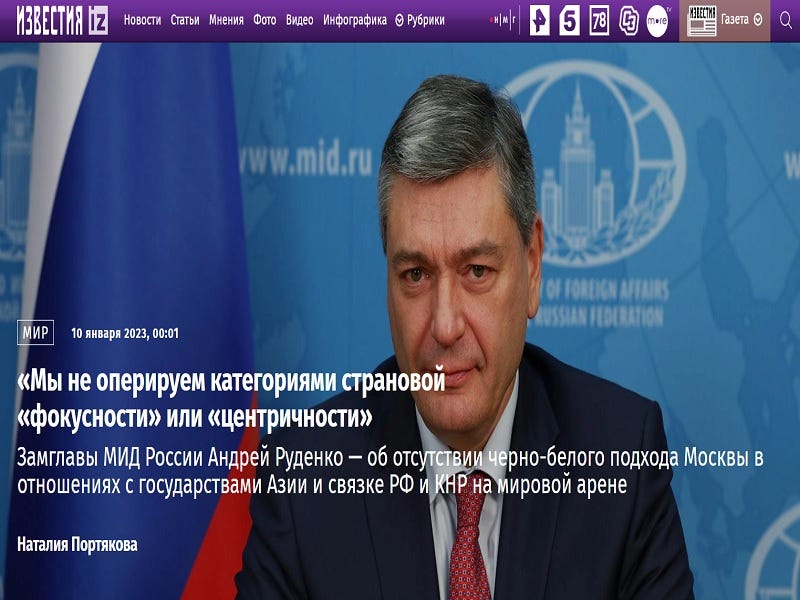The insight shared in Russian Deputy Foreign Minister Andrey Rudenko’s interview with Izvestia leads to five conclusions about the state of strategic affairs in Asia, from which an equal number of predictions about Russia’s Asian policy can be made.
Russian Deputy Foreign Minister Andrey Rudenko confirmed in an interview with Izvestia that the US failed to drive a wedge between his country and its Asian partners over the past year. This is a significant point since it proves that the declining unipolar hegemon’s divide-and-rule policy isn’t as effective as it once was contrary to the claims propagated by the US-led West’s Mainstream Media (MSM). Far from being “isolated”, Russia is more deeply embedding itself into the center of global economic growth.
As Rudenko explained, this trend isn’t anything new but the natural outcome of Russia’s mutually beneficial engagement with Asia that began long before its special operation in Ukraine. While energy exports to China and India admittedly play an outsized role in its trade with the region, they aren’t the entirety of its ties with those countries. Agricultural, commercial, epidemiological, interpersonal, law enforcement, military, nuclear energy, and technological cooperation is growing with both of them too.
Not only that, but ASEAN also occupies a prominent role in Russia’s Asian foreign policy framework, which contributes to discrediting the claim spewed by the MSM alleging that Moscow’s ties with the region are Sino-centric. China remains among that Eurasian Great Power’s top partners anywhere in the world, but its strategic partnerships with ASEAN as a whole and especially India help balance out any perceived disproportionate dependence on the People’s Republic.
Apart from those three, Russia also retains important ties with Mongolia too, Rudenko remarked. Furthermore, he noted that relations with South Korea aren’t as bad as some might have thought despite that country’s inclusion on Moscow’s list of unfriendly countries. This leading diplomat praised Seoul’s pragmatism in only implementing the most moderate of Washington’s anti-Russian sanctions demands and said that Moscow is interested in improving ties whenever its partner is ready.
As for Japan, he noted that in spite of Tokyo unquestionably fulfilling its American overlord’s demands nowadays, it continued participating in Russia’s regional energy projects under the pretext of “ensuring national energy security”. This observation reinforces the perception that there are indeed limits to how far the US can enforce its will even upon its most loyal vassals, who remain loath to unilaterally concede on all aspects of their objective national interests just to please their patron halfway across the world.
The strategic commonality between Russia and its Asian partners, with the arguable exception of South Korea and Japan as was just explained, is that they’re united in their desire to expand mutually beneficial cooperation with a view towards accelerating the global systemic transition to multiplexity. Rudenko added that this is evidenced by more countries expressing interest in joining the SCO in clear defiance of Western diplomats pressuring them to jump on the anti-Russian sanctions bandwagon.
The insight shared in his interview leads to five conclusions about the state of strategic affairs in Asia. First, the US truly failed to drive a wedge between Russia and its Asian partners. Second, Russia’s ties with Asia aren’t Sino-centric but balanced due to its strategic partnerships with ASEAN and especially India. Third, even South Korea and Japan haven’t totally cut ties with Russia. Fourth, Asia as a whole is increasingly independent of the US. And fifth, Asia is quickly becoming the center of multipolarity.
From these five conclusions, an equal number of predictions can be made about Russia’s Asian policy. First, Asia will remain Russia’s top foreign policy priority. Second, Russia will continue diversifying its Asian outreach efforts. Third, it’ll do so by comprehensively expanding ties with ASEAN and especially India. Fourth, none of the preceding two predictions will be at the expense of ties with China. And fifth, the Russia-India-China (RIC) core of Asia will collectively lead the continent’s multipolar future.





Russia and China crucial to the move to multipolarity, with Indian support of the former also crucial. Ideally India will see that despite border issues and China's pro-Pakistsn ties, it really has a better future allying with China rather than the predatory West which has only recently switched to supporting India as a counter to China, not from any concern for India.